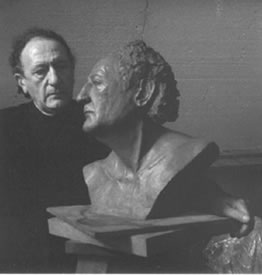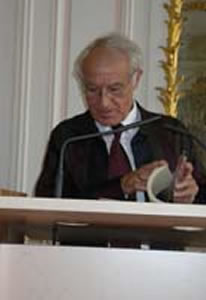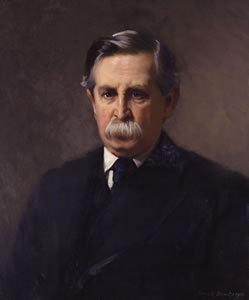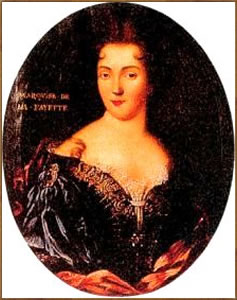De Nicaraguaanse schrijver Rubén Darío werd geboren in Metapa, tegenwoordig Ciudad Darío, op 18 januari 1867. Zie ook mijn blog van 18 januari 2007 en ook mijn blog van 18 januari 2008 en ook mijn blog van 18 januari 2009.
Nocturne
I want to express my anguish in verses that speak
of my vanished youth, a time of dreams and roses,
and the bitter defloration of my life
by many small cares and one vast aching sorrow.
And the voyage to a dim orient in half-seen ships,
the seeds of prayer that flowered in blasphemies,
the bewilderment of a swan among the puddles,
the false nocturnal blue of a sick Bohemia.
Far-off harpsichord, silent and forgotten,
that never gave my dreams the sublime sonata;
orphan skiff, heraldic tree, dark nest
which the night made lovely with its silver light;
Hope still aromatic with fresh herbs; the trill
of the nightingale in the morning in the spring;
the white lily cut down by a fatal destiny;
the search for happiness, and evil’s persecutions–
And the dismal amphora with its divine poison
that causes the inner torments of this life;
the fearful knowledge of our human mire;
and the horror of knowing that we are transitory,
the horror of walking blindly, among alarms,
toward the unknowable, toward the inevitable;
and the brute nightmares that rack our weeping sleep,
from which no one but She can wake us up!
Vertaald door Lysander Kemp
Nightfall In The Tropics
There is twilight grey and gloomy
Where the sea its velvet trails;
Out across the heavens roomy
Draw the veils.
Bitter and sonorous rises
The complaint from out the deeps,
And the wave the wind surprises
Weeps.
Viols there amid the gloaming
Hail the sun that dies,
And the white spray in its foaming
“Miserere” sighs.
Harmony the heavens embraces,
And the breeze is lifting free
To the chanting of the races
Of the sea.
Clarions of horizons calling
Strike a symphony most rare,
As if mountain voices calling
Vibrate there.
As though dread, unseen, were waking,
As though awesome echoes bore
On the distant breeze’s quaking
The lion’s roar.
Vertaald door Thomas Walsh

Rubén Darío (18 januari 1867 – 6 februari 1916)
De Zwitserse schrijver Peter Stamm werd geboren op 18 januari 1963 in Weinfelden. Zie ook mijn blog van 18 januari 2007 en ook mijn blog van 18 januari 2008 en ook mijn blog van 18 januari 2009.
Uit: Sieben Jahre
“Sonja stand in der Mitte des hellerleuchteten Raumes, im Zentrum wie immer. Sie hielt den Kopf etwas gesenkt und die Arme nah am Körper, ihr Mund lächelte, aber ihre Augen waren zusammengekniffen, als blende sie das Licht oder als hab
e sie Schmerzen. Sie wirkte abwesend,
ausgestellt wie die Bilder an den Wänden, die niemand beachtete und die doch der Anlass des Zusammenkommens waren.
Ich rauchte einen Zigarillo und beobachtete durch das große Schaufenster der Galerie, wie ein gutaussehender Mann auf Sonja zuging und sie ansprach. Es war, als erwache sie. Sie lächelte, stieß mit ihm an. Er bewegte den Mund, in ihrem Gesicht war ein fast kindliches Erstaunen zu sehen, dann lächelte sie wieder, aber selbst von hier aus sah ich, dass sie dem Mann nicht zuhörte, dass sie an etwas anderes dachte.
Sophie war neben mir stehen geblieben. Auch sie schien nachzudenken. Dann sagte sie, Mama ist die schönste Frau der Welt. Ja, sagte ich und streichelte mit der Hand über ihren Kopf. Das ist sie, deine Mutter ist die schönste Frau der Welt.
Es hatte seit dem Morgen geschneit, aber der Schnee schmolz, sobald er den Boden berührte. Mir ist kalt, sagte Sophie und schlüpfte durch die Tür, die eben jemand geöffnet hatte, in die Galerie. Ein großer, kahlköpfiger Mann war herausgekommen, eine Zigarette im Mund. Er blieb unangenehm nah vor mir stehen, als kennten wir uns, und zündete sich die Zigarette an.
Krasse Bilder, sagte er. Als ich nicht antwortete, wandte er sich ab und ging ein paar Schritte von mir weg. Er wirkte plötzlich unsicher und etwas verloren.
Ich schaute noch immer durch das Schaufenster. Sophie war zu Sonja gelaufen, deren Gesicht sich aufhellte. Der gutaussehende Mann, der immer noch neben ihr stand, schaute etwas betreten, fast beleidigt auf das Kind. Sonja beugte sich zu Sophie hinunter, die beiden redeten kurz miteinander, und Sophie zeigte nach draußen. Sonja schirmte mit der Hand die Augen ab und
schaute mit gerunzelter Stirn und einem irritierten Lächeln in meine Richtung. Ich war ziemlich sicher, dass sie mich nicht sehen konnte in der Dunkelheit.”

Peter Stamm (Weinfelden, 18 januari 1963)
De Franse schrijver en beeldhouwer Roger Bésus werd geboren op 18 januari 1915 in Bayeux. Zie ook mijn blog van 18 januari 2009.
Uit: Journal 1962 – 1972
„1er juillet 1962 – Je viens d’écrire le mot Fin… Mon roman est d’un pessimisme épouvantable. Il illustre ma pensée qu’il n’y a de bonheur total qu’en échappant au monde par le rêve ou la folie. Et le mot d’émilia qui conclut mon roman est à ce titre bouleversant. J’ai sangloté tout au long du passage où Jeanne évoque son fiancé. Enfin j’aimerais qu’on me fît crédit pour tout ce qui est contradiction et foisonnement dans mes pages : cela est destiné à traduire de manière incernable la vérité, la vérité qui est incernable. Je crois que je n’aurais jamais joué aussi bien qu’ici avec le symbole et son approximation – car je lui refuse l’exactitude. évidemment je suis heureux d’avoir écrit cet ouvrage. Je le crois destiné à durer bien des générations.
(…)
29 mai 1970 – Aperçu hier, dans un hebdomadaire ou mensuel du style Elle ou Marie-Claire : Le mariage est contre nature. Les imbéciles, ils le remplaceront par quoi ? Car il y a les enfants. Dire « contre nature » ce qui est une institution sans doute immémoriale est du reste ne pas savoir ce qui est « naturel », naturel à l’homme, j’entends. On veut tout ramener au coït et voir en lui la seule finalité de l’homme. Mais alors c’est ne pas se soucier de l’homme naturel, c’est se soucier de l’animal dans la nature, de l’infra-homme, c’est, fût-ce symboliquement, arrêter la création un jour plus tôt. Je crois que je n’ai rien écrit d’aussi juste pour expliquer cette civilisation, que les quelques lignes de La Couleur du Gris où j’associe technocratie et pourrissement. Le technocrate, c’est le Néron moderne, qui gouverne dans le mépris de ceux qu’il endort par la satisfaction qu’il leur procure du pain et des jeux.“

Roger Bésus (18 januari 1915 – 17 februari 1994)
Hier bij een “zelfportret”
De Amerikaanse schrijver, filosoof, futuroloog, anarchist en onderzoeker Robert Anton Wilson werd geboren op 18 januari 1932 in New York. Zie ook mijn blog van 18 januari 2008 en ook mijn blog van 18 januari 2009.
Uit: Prometheus Rising
“The third semantic circuit handles artifacts and makes a “map” (reality-tunnel) which can be passed on to others, even across generations. These “maps” may be paintings, blueprints, words, concepts, tools (with instructions on use transmitted verbally), theories, music, etc.
Human beings (domesticated primates) are symbol-using creatures; which means, as the pioneer semanticist, Korzybski, noted, that those who rule symbols, rule us.
If Moses, Confucius, Buddha, Mohammed, Jesus and St. Paul can be considered living influences—and they are: look around the world—this is only because their Signal has been carried to us by human symbol systems. These systems include words, artworks, music, rituals and unrecognized rituals (“games”) through which culture is transmitted. Marx and Hitler, Newton and Socrates, Shakespeare and Jefferson, etc. continue to “rule” parts of humanity in the same way—through the semantic circuit.
We are ruled even more, and even less consciously, by the inventors of the wheel, the plow, the alphabet, even the Roman roads.
Since words contain both denotations (referents in the sensory-existential world) and connotations (emotional tones and poetic or rhetorical hooks), humans can be moved to action even by words which have no real meaning or reference in actuality. This is the mechanism of demagoguery, advertising and much of organized religion.

Robert Anton Wilson (18 januari 1932 – 11 januari 2007)
De Duitse schrijver Arno Schmidt werd op 18 januari 1914 geboren in Hamburg. Zie ook mijn blog van 18 januari 2007 en ook mijn blog van 18 januari 2009.
Uit: Julia, oder die Gemälde
“Ihering: “Ja, das’ss der Fundamentalirrtum der Marx & Sozialisten : daß alle Menschen gleich seien: und man, durch bloßes Vorhalten von Wissensfutter, über Nacht ein vorbildliches Volk produzieren könnte : nichts als kluge, kulturtragende (oder gar =schaffende) EdelMenschen. Und das hätten bisher nur die Kapitalisten verhindert. – Ach nein, die Menschen sind sehr verschieden – viele dumm, schlecht, grausam; und werden noch lange so bleiben : ‘Vererbung’ ist kein leerer Wahn! Sinn und Geschmack für Kulturgüter sind einfach nicht vorhanden; auch nicht anzuerziehen; ja, schon das simple ‘NaturGefühl’ ist recht selten. Ob Arbeiter, ob Bauern, ob ‘Akademiker’ sind Barbaren, die sich nicht binnen einer halben Generation in Schnellkursen zu Roten RenaissanceGiganten machen lassen; sondern wie Entwicklungsvölker angesehen werden müßten; die man langsam, so 3-400 Jahre lang zu züchten & schulen versuchen müßte.” (Ja, vielleicht wäre sogar das mit in Anschlag zu bringen: Wir haben eine fette Milliarde Jahre hindurch in so manchen TierVerkleidungen auf Erden gelebt, und sind nicht gut geworden – : vielleicht sollen Wir nicht gut sein?)”
(…)
(Über Theologen): “Wenn man diesen Wust von Gelehrsamkeit und Unwissenheit, von Scharfsinn und Borniertheit, von Weisheit und Frivolität, von unerforschlicher Geistestiefe und unglaublicher Schalheit durchstöbert, so erstaunt man über die Gesetzlosigkeit der Gesetze des Denkens, über die Vereinbarkeit der höchsten Intelligenz mit der tiefsten Finsternis, über den Mißbrauch des eminentesten Scharfsinns, der angehalten wird, die crasseste Dummheit zu beleuchten, und über die Verschwendung des allumfassendsten, oft 40=jährigen Studiums, welches sich zur Aufgabe macht Windeier auszubrüten, mit einem Ernst, als ob ein Göttergeschlecht aus diesen Eiern hervorgehen sollte!”

Arno Schmidt (18 januari 1914 – 3 juni 1979)
De Oostenrijkse schrijver, vertaler en uitgever Frans Blei werd geboren op 18 januari 1871 in Wenen. Zie ook mijn blog van 18 januari 2009.
Uit: Erzählung eines Lebens
„Im Briefkasten des »Berner Bund«, in welcher Zeitung er das Departement der Literatur mit Ansehen und nicht ohne Einsichten verwaltete, druckte Josef Victor Widmann im Mai 1897 einige Strophen und gab dem nicht genannten Dichter wohlgemeinten Rat, daß und wie es besser zu machen. Als Bodmer und Gottsched in einer Person. Vor diesen Strophen hatte der Praeceptor in litteris die Grenze seiner kritischen Fähigkeiten erreicht. Diese Gedichte waren ungewöhnlich schön und hatten ihren eigenen Ton. Auf eine Anfrage gab der Berner Redaktor Antwort, wie der Dichter hieße und wo er wohne, in Zürich wie man selber. Ich bat ihn in einem Briefe um seinen Besuch. Und ein paar Tage drauf öffnete ich auf ein Klingeln die Türe, und davor stand ein ganz junger Mensch, sah aus wie ein wandernder Handwerksbursch in einer etwas zu knappen Jacke, aus deren kurzen Ärmeln große, etwas rote Hände kamen, die den Hut hielten, und über dem geröteten, schweizerisch knochigen Jungensgesicht struppelte ein Weizenfeld von Haaren. »Ich bin der Walser«, sagte der Wanderbursch.
Er sah in der Tat nicht nur so aus. Immer nur wenn es gerade nötig war, um ein paar Franken für ein sehr einfaches Leben zu verdienen, verdingte er seine geringen Kenntnisse, aber seine überaus schöne feine Handschrift an ein Bankgeschäft und war da ein Schreiber. Nicht ungern, nicht aufsässig. Nur wenn das Wetter mailich wurde und die Sonne schien, litt er ein wenig darunter, »verlegen kratzen zu müssen am Hals unter dem strengen Blick des Prinzipals«, gab die Winterstelle auf und zog über die Landstraßen, ein sehr sauberer und gar nicht robuster, eher zierlicher Wanderbursch, wie aus der Geschichte von Eichendorff herausspaziert. Oder wie ein Kaspar Hauser, der nach seinem Schicksal unterwegs ist. Ganz und gar nicht wie ein Dichter mit dem Schreibtäfelchen im Busen und hungrig nach dem Vers. Als Walser zum zweitenmal zu mir kam, brachte er ein in schwarzes Glanzleinen gebundenes, hübsch liniertes Schulheft mit. Darein hatte er mit seiner sauberen Hand, der des Bankkommis, seine Gedichte geschrieben, etwa vierundzwanzig waren es, keines die Pastiche eines andern; jedes war etwas und stand für sich, Klage nicht lauter als ihr Anlaß, Freude nicht stärker als ihr Grund. Voll Zartheit in der Farbe, nie im Undeutlichen verschwimmend, immer gehalten von einer guten Struktur schweizerischer Jungensknochen, die sich um nichts in der Welt in Stimmungssülze legen lassen.”

Frans Blei (18 januari 1871 – 10 juli 1942)
De Franse schrijver Paul Léautaud werd geboren op 18 januari 1872 in Parijs. Zie ook mijn blog van 18 januari 2009.
Uit: Le petit ami
„La région qui m’était la plus familière, celle où mes yeux s’emplissaient des images que je devais conserver toujours, était celle qui
est comprise entre les rues Notre-Dame-de-Lorette et Fontaine, les boulevards de Clichy et Rochechouart, et les rues Rochechouart et Lamartine. Tout ce quartier est resté pour moi plein d’une couleur et d’une vie particulière. Né quelques rues plus bas, du côté du Palais-Royal, c’est là que j’ai grandi, après avoir été si malade que les médecins assuraient que je ne vivrais pas, là que j’ai fait tant de pas et regardé tant de choses et commencé aussi à aimer les femmes, petit garçon très lent et qui souriait à peine, malgré tout son bonheur. Les maisons où mon père habita, rue des Martyrs et rue Rodier, la maison où demeurait ma vieille bonne Marie, rue Clauzel, et les maisons où j’allais voir des dames que mon père connaissait, rue de la Tour-d’Auvergne, avenue Trudaine et boulevard des Batignolles, n’ont pas changé depuis. Lorsque je vais par là et que j’arrive, dans le faubourg Montmartre, à ce tournant où il y a, à droite, une boutique de bijouterie avec une grosse horloge à double cadran, mon émotion est toujours la même de retrouver ce quartier tel à peu près que je le connus. Et quand, plus haut, je passe devant ces maisons et que je m’arrête à leur porte pour regarder ces cours que tant de fois je traversai, seul ou tenu par la main, je me sens envahir d’une douceur et d’une tendresse que je ne saurais dire… »

Paul Léautaud (18 januari 1872 – 22 februari 1956)
Zie voor nog meer schrijvers van de 18e januari ook mijn vorige blog van vandaag.







